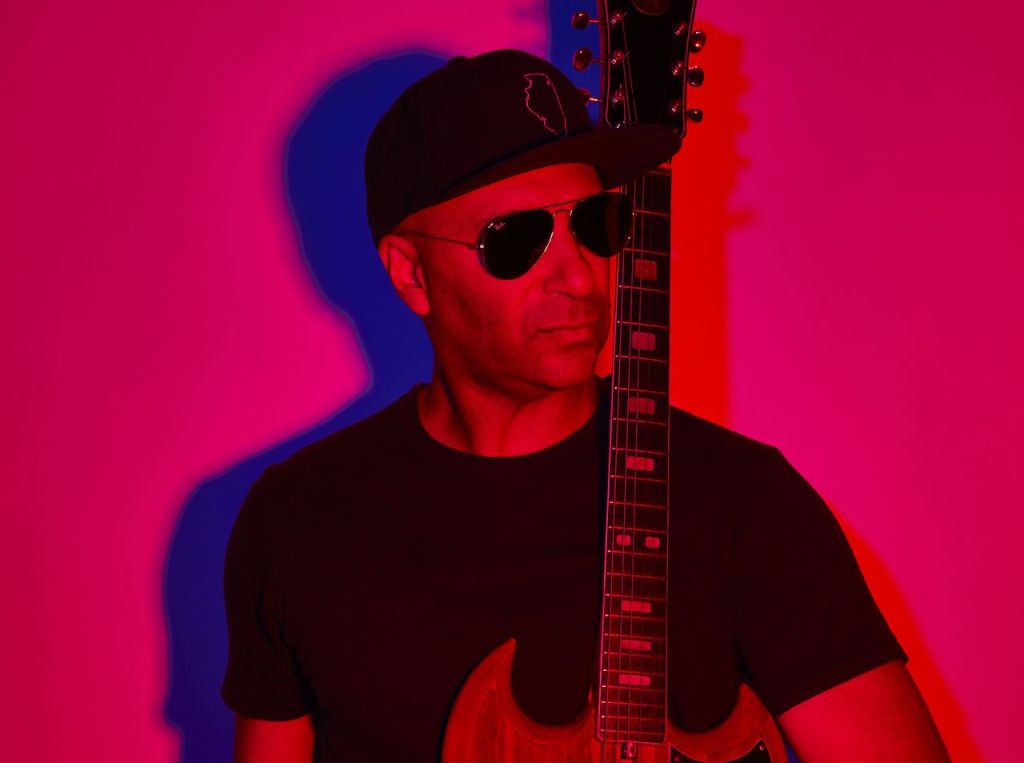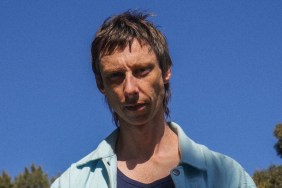Guitar god Tom Morello needs no introduction around these parts, or arguably any other. An undeniable icon of rock and metal, Morello has been a constant presence in the lives of heavy music fans since Rage Against The Machine exploded to worldwide prominence in 1992. With over 20 studio albums to his name spread across Rage Against The Machine, Audioslave, Profits of Rage and The Nightwatchman, not to mention several years as a touring member of Bruce Springsteen’s E-Street Band, Morello would have been forgiven for just kicking back and enjoying some rare downtime during the COVID-19 era.
Instead, he put that time to good use, rediscovering and reconnecting with his identity or ‘guitarness’ as he has put it, using the instrument to collaborate in new and exciting ways with artists from all over the globe. The result of this spiritually invigorating and artistically awakening set of collaborative experiences is the genre-hopping record The Atlas Underground Fire. The guest-laden record sees Morello collaborate with a diverse array of artists including Bring Me The Horizon, Bruce Springsteen and Eddie Vedder, Chris Stapleton, Damian Marley, Grandson, Mike Posner, Phantogram and Refused’s Dennis Lyxzen. A true sonic adventure, the record is a statement of intent from Morello, an artistic reflection on the role of the electric guitar in the future of music.
In the lead up to the release of the album, Music Feeds spoke to the legendary axeman himself about the inspiration for and process of making The Atlas Underground Fire, taking some rewarding detours into his work with Girls With Guitars, the innate connective power of music, his hopes to return to Australia again and his personal favourite riff he has ever written.
Music Feeds: We’re talking to you today Tom because of The Atlas Underground Fire your new album, which is about to drop on an unsuspecting world. What was the initial inspiration for this genre-hopping sonic adventure?
Tom Morello (TM): This record is a plague record. This is a record that was made in total isolation on my part, during the height of the pandemic. For the first four months when the world shut down in March 2020, it was the first time as a grownup that I had not been writing, recording or performing music, and I didn’t touch a guitar for about four months.
The initial inspiration came from a very unlikely source, in that I read an interview where Kanye West was bragging about recording the vocals for a couple of his albums on the voice memo app on his iPhone. So I just started recording some guitar riffs into the voice memo of my iPhone and sending them to producers, engineers and artists around the world and it sounded fucking fantastic. So I was like, okay, the stars really do shine above the cloud cover.
It really was a lifeline, a life raft and antidepressant more so than it was a creative endeavour. So throughout the year, I decided to record music without any sort of intention that it was going to be the Atlas Underground sequel. It was just me trying to find a way to survive Tuesday, and I found that I can do so by recording some hot riffs into my phone and sending them to interesting artists, friends new and old around the globe.
MF: That sounds like an excellent way to pass the time during the pandemic and the results certainly speak for themselves, but Kanye as the source of inspiration for a Tom Morello album is not something I had on my COVID-19 bingo board!
TM: It was just such a bold sentence to me. “I’ve recorded the vocals for two albums on the voice memo app.” I was like can you do that? It turns out you can do that!
MF: In terms of curating who you were going to work with here, what was the criteria for who you approached to work with? It is such a diverse array of artists, some that make sense to me immediately, such as Bring Me The Horizon, Bruce Springsteen and Eddie Vedder or even Chris Stapleton, but then some others such as Damien Marley, Grandson or Mike Posner that aren’t such obvious matches, at least sonically speaking. How did you choose who got the nod to be on this record?
TM: I’ve always been very comfortable in the skin of someone who confounds expectations you know? One of the mission statements of this record is that the electric guitar has a future and not just the past, and in curating the sounds and collaborators on this record it is an assertion of that premise, that the electric guitar, has a future. A lot of electric guitar players are traditionalists, bless their hearts, I’m not one of them. I constantly want to see what the guitar can be and how it can reinvent itself in the future. Curating an album where uncompromising riffs and guitar solos and whatnot lead the way but by weaving a path through various genres, that’s very satisfying to me.
As far as some of the particular artists you bring up go I have a much longer history in some ways with Bruce Springsteen and Eddie Vedder than I do a band like Bring Me The Horizon. I played in the E-street Band for six years, and Eddie Vedder, Bruce and I performed the AC/DC song ‘Highway to Hell’ in a Melbourne football stadium together, you know, in 2014. And so, the impetus for that particular song was that in a time of this cloistered isolation, I was able to reflect back on that lightning strike moment of community and tribal gathering and peak excitement, to gain inspiration.
To look back at a time when, as Hemingway said, we were “living all the way up” while living in a moment when none of us was living all the way up, it allowed us to harness and record some of that spiritual energy that we often shared on stage together that we were all missing so much.
MF: That’s an interesting statement you made at the top. That the electric guitar has a future because I would agree with you that it does. The music industry however seems to have decided that guitars are uncool as a lead instrument. So I find it fascinating that you’re now approaching it in a way that works within that context saying hey, here’s what the guitar can do as an accompanying instrument, as a layer in the songwriting process. As you move forward with your songwriting is that something you’re going to look to do more frequently in the future?
TM: I’ve always endeavoured to sort of push the boundaries of what the guitar can do and, and sort of creating an alloy between, the analogue, do it with my bare hands, Marshall, stack madness, and bass drops and whatnot. I’ve always played the guitar on the left-most limits of stuff that sounded like DJs or the textures that are heard in electronic music or that sounded like R2-D2 or two barnyard animals or whatever. I tried to make it so it’s not clear on these records, where the guitar stops and the electronic components begin.
MF: I don’t what you to have to play favourites, but are there any songs on here where you feel like you’ve nailed the idea, perfectly?
TM: The idea opens the record, the song ‘Harlem Hellfighter’. That’s one of three instrumental tracks on the record that sort of asserts my identity as a musician. Those ideas came at a time when for a lot of us, our professional identities had been stripped away. I was no longer a musician, all of a sudden I was a plumber, a caretaker and a teacher and whatever else. So the idea that I could assert my ‘guitarness’ with these molten instrumental pieces, was an important part of the process of me rediscovering and reclaiming my identity, as a musician.
MF: Now, it’s a Tom Morello record, so of course, there are lyrical elements of a political nature on many of these tracks. This leads me to ask, how do you feel protest music is going in the current modern context? Are you impressed with what you’re hearing? Or do you think that artists could be producing or doing more given the hellfire we’ve all found ourselves in?
TM: The one thing that I’ve never concerned myself with is like, kind of what other artists are doing. I think, like, sort of following my own Northstar is enough. What I will say is that regardless of vocation, it’s important for people to not deny their own convictions. So if you’re an artist who has feelings about the world and you implant them in your art, bless your heart. If you’re an artist that has feelings about the world, and you don’t do that, because you think it’s going to harm you commercially, there’s an extra hot level of hell for people who do that. But I would not put that in the ghetto of just music. I think that whether you are someone who interviews, artists, or someone who writes for a paper, or someone who is a plumber, or a student, etc, etc, don’t deny who you are in what you do.
MF: That’s a great message. Following up on this, you were recently backing your own convictions, trying to help the organisation Girls With Guitars get twelve young female guitarists out of Afghanistan and into somewhere safer for them to be. Can you update us on where that situation is at, have these brave young artists found a way out of the country yet?
TM: There is no end result other than that where they are, they are currently safe, and in hiding. For anyone reading who doesn’t know, Girls With Guitars is a great organization formed by this ‘80shair metal musician who got into the religion of love and moved to Afghanistan to save these street children, who had been orphaned by war and had these horrible, traumatic pasts. He made a school for them to sort of use music as a rehabilitation tool. I was able to record some songs with them and made videos with them, and they’re just these wonderful human beings who have found a way to redeem their lives through music.
When the Taliban took over, they became marked for death, because they had been playing Western music and had this American teacher and whatnot. So we’ve been trying to get them out of the country, and we have sadly not been successful so far. But they are safe and the efforts continue around the clock to keep them safe and to help get them out so that they may live more fulfilling lives.
MF: Well, it’s relieving to hear that they’re safe. This situation is a good way of illustrating how music can have an impact in the ways that you were you were saying, and also it shows the cross-cultural, communicative power of music, which I think has always been a major part of the universal appeal of music. Does it seem to you that that power is often sort of undersold a lot?
TM: Absolutely. I think in some ways, it’s the whole point. Especially so when you tread in the territory of protest music. There’s no better way of galvanizing people than through this art. Music predates written and spoken language, the tribal gathering, it’s in our DNA, it’s in our caveman DNA, to gather together with rhythm and chanting. When you marry that with something that sounds very much like the truth, it really resonates and then there’s really no ceiling to the connection you can make with an individual or with an audience via that truth.
MF: Thinking about the context of your career, and the influence that you’ve had on heavy music as a whole, is there anything that stands out as what you think is your biggest influence or your biggest moment of influence as a guitarist?
TM: For me, the genesis of it, people who pick up an instrument, turn into two camps, there are musicians and there are artists. For the first 10 years of playing the guitar, I became a very technically talented musician, but I couldn’t write music that I particularly liked. And I did not have my own voice on the instrument and it was only, you know, only around the beginning of Rage Against The Machine when I began self-identifying as the DJ in the band, that I was able to begin to cobble together a unique vocabulary that you know that I’ve been speaking in ever since on the instrument.
MF: Now we can hear that musical vocabulary being spoken by many other artists, particularly in the hardcore, metalcore and punk spectrum and the crossover between those, bands like Stray From The Path and Fever 333 for instance utilise that musical vocabulary in a very obvious way, meanwhile other bands like Bring Me The Horizon who you worked with on this release are also speaking it, just with a little more of an accent. Are these the type of acts that you feel are going to be important in bringing the guitar into the next era of music?
TM: Absolutely. I mean Bring Me The Horizon, they are one of the groups that I think is important in helping to forge the future of the guitar. Having said that I think that the guitar has a multiplicity of futures. So there’s is one future and I’d like to help forge at least one of those paths.
On ‘Let’s Get The Party Started’ we’re forging one together. It is one of my favourite songs on the record. It contends with the anxiety of the plague days but also is an unapologetic fucking jam. I got a message from a friend of mine today, he said, your guitar solo in that song feels like I’ve felt for the last 18 months, just all messed up.
MF: So I will ask you a couple of trademark questions that I have for every artist that comes on. The first one is, what is your personal favourite riff you’ve written?
TM: I reserve the right to change my mind in the future, but off the top of my head, I’m going to say the riff from ‘Cochise’, the first song on the first Audioslave record.
MF: It is such a killer riff and it is paired with one of Cornell’s best vocal takes, I agree that’s a special song for all of you. The next one is if you could have any song play whenever you enter a room, just like pro-wrestlers do, what song would you want it to be?
TM: Again, off the top of my head I’m it’s a split decision between AC/DC ‘Hells Bells’ and Pantera’s ‘I’m Broken’.
MF: That’s fuckin awesome, you can mix them together, we have the technology now, it’s on your iPhone!
Now it has been a thrill for me to talk to you today Music Feeds Tom, and we all wish you all the best with the record, but I wouldn’t be able to leave an interview talking to Tom Morello without at least asking if we will we ever see Rage Against the Machine in Australia again?
TM: I hope so. Fingers crossed I’d love to do it. I have had some of my favourite live moments of rocking ever in Australia. Honestly, I gotta tell you that’s true of my visits with Rage, Audioslave, Profits Of Rage, Nightwatchman and Bruce Springsteen. I’ve made a lot of my peak moments in your country, and so I hope that I’m back there and I’d love to be back soon. Fingers crossed.
–
‘The Atlas Underground Fire’ is out this Friday October 15. Pre-order or pre-save here.












